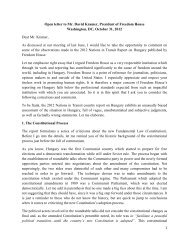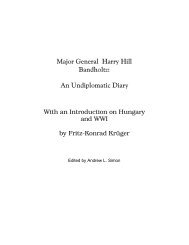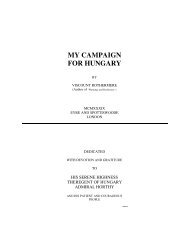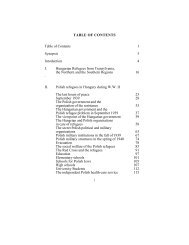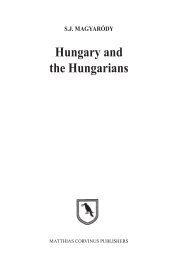The Fate of Western Hungary 1918-1921 - Corvinus Library ...
The Fate of Western Hungary 1918-1921 - Corvinus Library ...
The Fate of Western Hungary 1918-1921 - Corvinus Library ...
You also want an ePaper? Increase the reach of your titles
YUMPU automatically turns print PDFs into web optimized ePapers that Google loves.
In the interest <strong>of</strong> maintaining open, just and honest international relations, to<br />
ensure the rule <strong>of</strong> law in the mutual exchange between free peoples and to<br />
ascertain and to have guarantee <strong>of</strong> the ethical respect in all manner <strong>of</strong><br />
international obligations, we have taken up arms and now stand with no enemy<br />
on our ancient land.<br />
To keep and ensure our achieved freedoms, we proclaim and form the<br />
independent, sovereign and neutral state <strong>of</strong> Lajta-Banate, comprised <strong>of</strong> the<br />
people in the territories to be evacuated [by <strong>Hungary</strong>-ed.] under the terms <strong>of</strong><br />
Article 27, paragraph 1 <strong>of</strong> the Trianon peace document.<br />
<strong>The</strong> prerogatives <strong>of</strong> Head <strong>of</strong> State will be vested in the Viceroy, who shall be<br />
elected by the Constitutional Assembly. Executive power will be exercised by<br />
the Viceroy through a six-member, responsible Governing Council. <strong>The</strong> <strong>of</strong>ficial<br />
language <strong>of</strong> the Banate is Hungarian; however, every citizen is free to use his<br />
mother-tongue in all <strong>of</strong>ficial and private matters.<br />
Laws and directives are to be publicized in the Hungarian, German and<br />
Croatian languages. Provisionally, the laws <strong>of</strong> the Hungarian state shall remain<br />
in effect.<br />
Every citizen <strong>of</strong> the Banate, without regard to his nationality, language or<br />
religious affiliation, is equal before the law and enjoys the same political and<br />
civil rights and responsibilities.<br />
<strong>The</strong> terms in this declaration <strong>of</strong> independence we accept as binding, which we<br />
will respect, and have others comply with, as attested by affixing our signatures<br />
and seals.<br />
Dated the fourth day <strong>of</strong> October, <strong>1921</strong> in Felsőőr.<br />
<strong>The</strong> Constitutional Assembly <strong>of</strong> Lajta-Banate.” 419<br />
According to the terms <strong>of</strong> the proclamation, the head-<strong>of</strong>-government and<br />
executive powers were exercised by a Viceroy [Bán] elected by the<br />
Constitutional Assembly, and assisted by a six-member Cabinet and the<br />
government. Provisionally, the <strong>of</strong>fice <strong>of</strong> Viceroy was filled by Pál Prónay, as<br />
Commander-in-Chief <strong>of</strong> the unified – on this day – five rebel armies. <strong>The</strong><br />
following day, the six-member Lajta-Banate cabinet was constituted. Its elected<br />
president (as well as being temporarily minister <strong>of</strong> the Religious Affairs and<br />
Public Education portfolios), was Capt. László Apáthy. Members: Ferenc<br />
Lévay, External Affairs (and temporarily Justice), Béla Bárdoss, Internal<br />
Affairs, György Hir, Economic Affairs, as well as Pál Prónay, military advisor.<br />
419 Missuray-Krúg, 1935, op. cit., pp. 161–163.<br />
162




